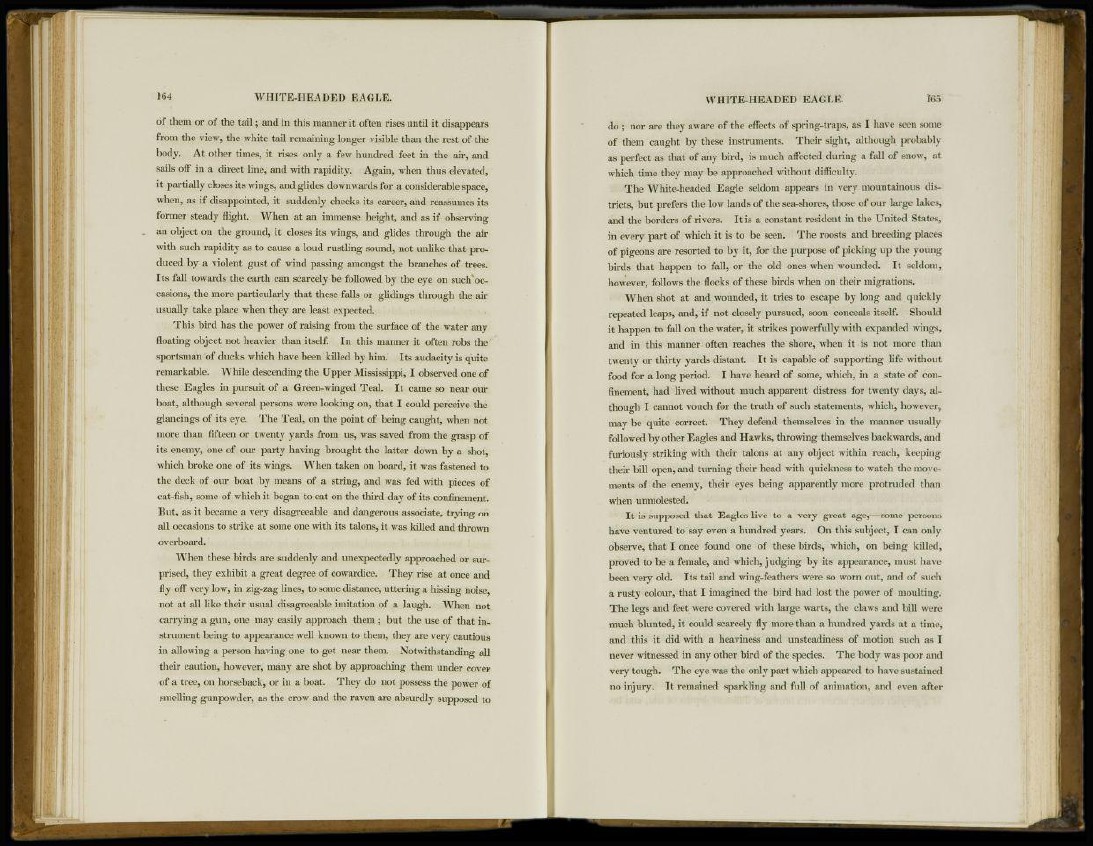
of them or of the tail; and in this manner it often rises until it disappears
from the view, the white tail remaining longer visible than the rest of the
body. At other times, it rises only a few hundred feet in the air, and
sails off in a direct line, and with rapidity. Again, when thus elevated,
it partially closes its wings, and glides downwards for a considerable space,
when, as if disappointed, it suddenly checks its career, and reassumes its
former steady flight. When at an immense height, and as if observing
an object on the ground, it closes its wings, and glides through the air
with such rapidity as to cause a loud rustling sound, not unlike that produced
by a violent gust of wind passing amongst the branches of trees.
Its fall towards the earth can scarcely be followed by the eye on such*occasions,
the more particularly that these falls or glidings through the air
usually take place when they are least expected.
This bird has the power of raising from the surface of the water any
floating object not heavier than itself. In this manner it often robs the
sportsman of ducks which have been killed by him. Its audacity is quite
remarkable. While descending the Upper Mississippi, I observed one of
these Eagles in pursuit of a Green-winged Teal. It came so near our
boat, although several persons were looking on, that I could perceive the
glancings of its eye. The Teal, on the point of being caught, when not
more than fifteen or twenty yards from us, was saved from the grasp of
its enemy, one of our party having brought the latter down by a shot,
which broke one of its wings. When taken on board, it was fastened to
the deck of our boat by means of a string, and was fed with pieces of
cat-fish, some of which it began to eat on the third day of its confinement.
But, as it became a very disagreeable and dangerous associate, trying on
all occasions to strike at some one with its talons, it was killed and thrown
overboard.
When these birds are suddenly and unexpectedly approached or surprised,
they exhibit a great degree of cowardice. They rise at once and
fly off very low, in zig-zag lines, to some distance, uttering a hissing noise,
not at all like their usual disagreeable imitation of a laugh. When not
carrying a gun, one may easily approach them; but the use of that instrument
being to appearance well known to them, they are very cautious
in allowing a person having one to get near them. Notwithstanding all
their caution, however, many are shot by approaching them under cover
of a tree, on horseback, or in a boat. They do not possess the power of
smelling gunpowder, as the crow and the raven are absurdly supposed to
do ; nor are they aware of the effects of spring-traps, as I have seen some
of them caught by these instruments. Their sight, although probably
as perfect as that of any bird, is much affected during a fall of snow, at
which time they may be approached without difficulty.
The White-headed Eagle seldom appears in very mountainous districts,
but prefers the low lands of the sea-shores, those of our large lakes,
and the borders of rivers. It is a constant resident in the United States,
in every part of which it is to be seen. The roosts and breeding places
of pigeons are resorted to by it, for the purpose of picking up the young
birds that happen to fall, or the old ones when wounded. It seldom,
however, follows the flocks of these birds when on their migrations.
When shot at and wounded, it tries to escape by long and quickly
repeated leaps, and, if not closely pursued, soon conceals itself. Should
it happen to fall on the water, it strikes powerfully with expanded wings,
and in this manner often reaches the shore, when it is not more than
twenty or thirty yards distant. It is capable of supporting life without
food for a long period. I have heard of some, which, in a state of confinement,
had lived without much apparent distress for twenty days, although
I cannot vouch for the truth of such statements, which, however,
may be quite correct. They defend themselves in the manner usually
followed by other Eagles and Hawks, throwing themselves backwards, and
furiously striking with their talons at any object within reach, keeping
their bill open, and turning their head with quickness to watch the movements
of the enemy, their eyes being apparently more protruded than
when unmolested.
It is supposed that Eagles live to a very great age,—some persons
have ventured to say even a hundred years. On this subject, I can only
observe, that I once found one of these birds, which, on being killed,
proved to be a female, and which, judging by its appearance, must have
been very old. Its tail and wing-feathers were so worn out, and of such
a rusty colour, that I imagined the bird had lost the power of moulting.
The legs and feet were covered with large warts, the claws and bill were
much blunted, it could scarcely fly more than a hundred yards at a time,
and this it did with a heaviness and unsteadiness of motion such as I
never witnessed in any other bird of the species. The body was poor and
very tough. The eye was the only part which appeared to have sustained
no injury. It remained sparkling and full of animation, and even after